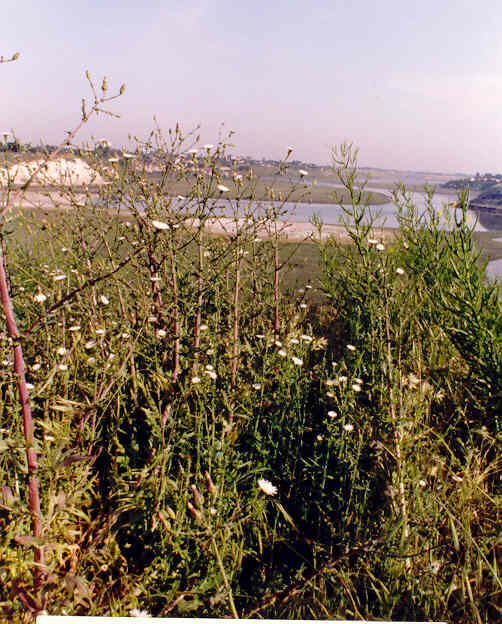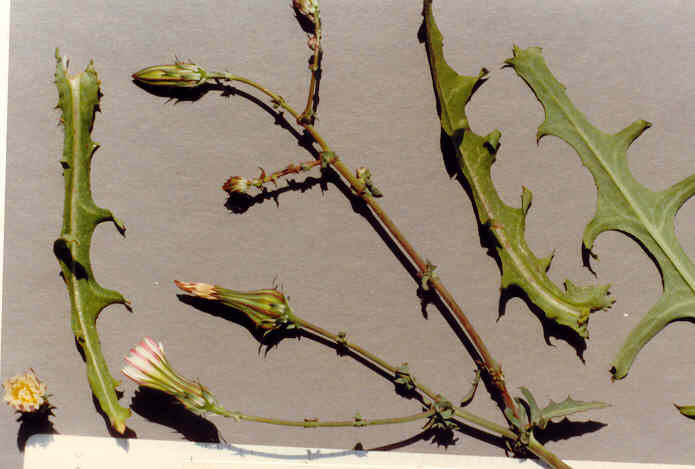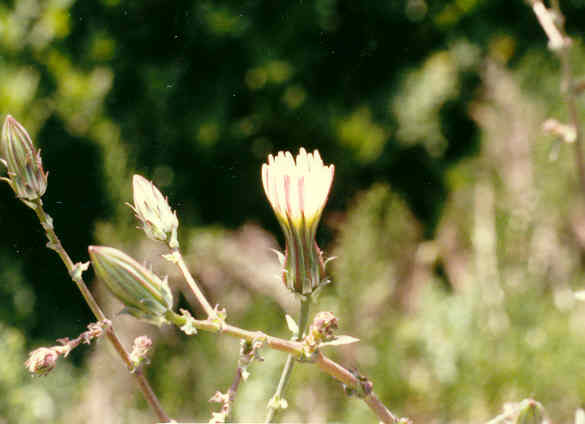
 |
Rafinesquia californica Nutt.Asteraceae (Sunflower Family)NativeCalifornia Chicory |
April Photo
Plant Characteristics: Annual,
2-15 dm. high, branched especially above; lvs. oblong in outline, 5-20 cm. long,
subentire to pinnatifid, the lower petioled, the others auriculate-clasping, the
uppermost much reduced; heads scattered, the invol. 15-18 mm. high; ligules
white but veined outside with rose-purple, 5-8 mm. long; ak. beak slender, ca.
as long as the body; pappus dull or brownish, the bristles plumose to the tip
with straight hairs.
Habitat: Most frequent
on burns and in disturbed places, at low elevs.; Coastal Sage Scrub. Chaparral,
etc.; cismontane from n. L. Calif.; Channel Ids.; occasional in Creosote Bush
Scrub, Joshua Tree Wd., deserts; to Utah, Ariz. April-July.
Name: Named for
Constantine Samuel Rafinesque,
1784-1842. Constantinople-born,
eccentric, wanderer-naturalist and self-styled linguist who, after a brief
sojourn in America moved to Sicily. He
finally settled in the United States and actively collected many objects of
natural history from fishes to toads and plants.
Many he described as new species. So
great was his zeal for naming new things that he claimed to have discovered and
gave names to twelve new species of lightning and thunder on the headwaters of
the Ohio River! Rafinesque was
given to inventing many nonsense generic names of peculiar sound and spelling.
(Jaeger 314). Californica, indicates the first specimens were found in Calif.
(Dale 13). Thomas
Nuttall, 1786-1859, dedicated the naming of this plant with the
following: "Dedicated to the
memory of an almost insane enthusiast in natural history; sometimes an accurate
observer, but whose unfortunate monomania was that of giving innumerable names
to all objects of nature and particularly to plants."
(Dale 72).
General: Occasional in
the study area, one plant having been found in 1986 in a small draw off Back Bay
Dr. between the Dunes Aquatic Park and the intersection of Back Bay Dr. with San
Joaquin Hills Rd. In April 1992 a
large colony was found just below the bluff top above the first sighting.
(my comments). R.
californica has been found to accumulate free nitrates in quantities capable
of causing death or distress in cattle. (Fuller
384). Two
species in the genus. (Munz, Flora So. Calif. 221.
Text Ref: Abrams, Vol. IV 574; Hickman, Ed. Munz, Flora So. Calif. 221; Roberts 13.
Photo Ref: April-May 86 #
2,3,4; April-May 92 # 11.
Identity: by John Johnson.
First Found: April 1986.
Computer Ref: Plant Data 333.
Have plant specimen.
Last edit 5/15/05.
 |
 |
April Photo April Photo